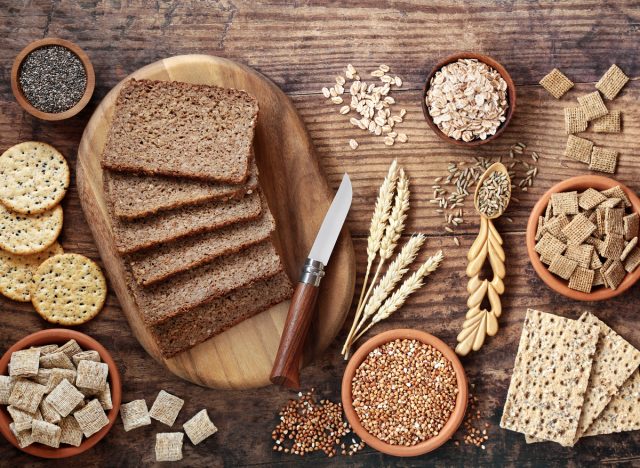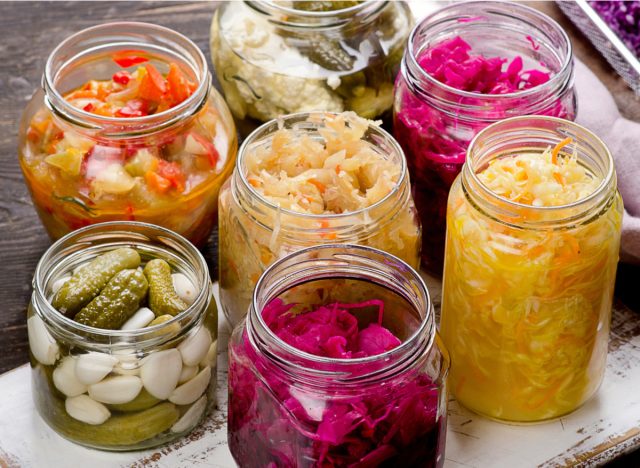Feeling Post-Holiday Stress? These Foods Can Help You Chill Out

For plenty of people, the holiday season is a time filled with gift-giving and parties with friends or family, not to mention delicious meals and delectable desserts. However, it can also be filled with last-minute shopping, awkward social gatherings, and marathon-length meal prep. That’s why you might find yourself more than just a little stressed during the holidays. Fortunately, while making your meals, you can aim to include certain foods that can help lower your level of stress by keeping your cortisol in check.
“Cortisol is a hormone that is produced by the adrenal gland, which is located above the kidney,” says Trista Best, MPH, RD, LD, with Balance One Supplements. “Cortisol is involved in many different functions in the body, including regulating metabolism, maintaining blood pressure, and helping the body respond to stress.”
Beyond that, Best says that “cortisol is produced in response to stress and low blood glucose levels.” Apparently, “when the body is under stress, the brain releases a hormone called corticotropin-releasing hormone (CRH), which stimulates the release of cortisol from the adrenal gland.” Best explains that “cortisol helps to increase blood sugar levels by converting proteins and fats into glucose, which can be used as an energy source.”
“Cortisol is produced and released in a pattern throughout the day, with levels typically being highest in the morning and lowest at night,” Best adds. “This is known as the ‘cortisol rhythm.’ Disruptions in the cortisol rhythm, such as those caused by chronic stress, can lead to negative health consequences.”
While Best notes that “cortisol is an important hormone that plays a role in maintaining homeostasis in the body,” she says that “high levels of cortisol over an extended period of time can have negative effects on health, such as weight gain, impaired immune function, and an increased risk of heart disease.”
That’s why you’ll definitely want to check out the following foods that Best says can help lower the cortisol levels in your body. Then, for more healthy eating tips, check out The Best Eating Habits for Your Gut Health.
Whole grains

While finding new ways to enjoy your holiday leftovers, you may want to opt for recipes that include whole grains such as oats, quinoa, and brown rice, according to Best. Offering plenty of potential health benefits, including lowering cholesterol and improving digestion, according to the Harvard T.H. Chan School of Public Health, they may also help to prevent both diabetes and cancer.
Beyond that, Best explains that whole grains “are rich in fiber and complex carbohydrates, which can help to regulate blood sugar levels and reduce the production of cortisol.”
Leafy green vegetables
If you love to nibble on fresh leafy greens, then you’ll surely be thrilled to find out that they’re another kind of food that offers a wide range of body-boosting benefits. Thanks to the fact that they contain a fair share of vitamins, minerals, and fiber, leafy greens can help to keep your brain sharp and prevent cognitive decline, while also lowering the risk of high blood pressure and heart disease, says Healthline.
Best also notes that “leafy greens are high in antioxidants and nutrients that may help to lower cortisol levels.” That’s why she suggests eating kale, spinach, and broccoli.
Nuts and seeds

Whether you’re preparing the main dish in your next meal, whipping a favorite dessert, or grabbing a quick midday snack, you might want to add a few nuts and seeds to the mix. Not only do they taste great and can add a crunchy texture to your dishes, but they’re also a great choice if you are feeling stressed.
“Nuts and seeds, such as almonds, walnuts, and chia seeds, are high in healthy fats and protein, which can help to reduce feelings of stress and lower cortisol levels,” Best says.
Berries
If you love blueberries, adore strawberries, and consider raspberries to be a tasty treat, then you should definitely include them in your cortisol-targeting diet. Best notes that berries “are high in antioxidants and nutrients that may help to lower cortisol levels.”
Antioxidants may also help to prevent diseases such as cancer and heart disease by keeping your cells safe, according to the Mayo Clinic, which is definitely an added bonus.
Fermented foods

Finally, if you’re feeling stressed during the holidays, Best recommends eating fermented foods. She explains that they “may help to regulate the gut microbiome and reduce the production of cortisol.”
Consider opting for yogurt, sauerkraut, and kimchi, and while you’re enjoying the taste, you can also appreciate the fact that they’ll likely lower your cortisol and help you feel a lot less stressed.
A final thought
“It’s important to note that while these foods may help to lower cortisol levels, they should be part of a balanced diet and not relied upon as the sole means of regulating cortisol,” Best is sure to point out. “Additionally, it’s important to manage stress through other means, such as exercise, relaxation techniques, and getting enough sleep.”









